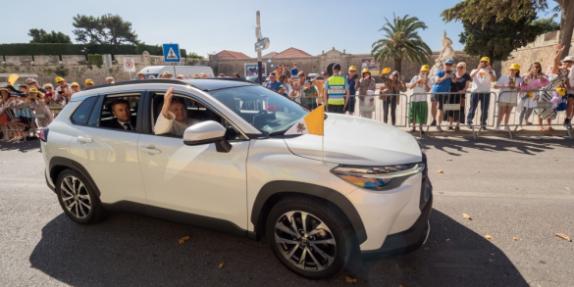
HC
At the roundabout on Avenida D. Nuno Álvares Pereira, in Estoril, the mural began that would end 3.5 km later, on Avenida Vasco da Gama, indicating to Pope Francisco the path that led to the Scholas Occurrentes, located at number 11 of Rua Gomes Freire, in the former Conde Ferreira School, in the historic area of Cascais. The Pope made the last contribution to this panel.
Until they get there, a crowd of people from Cascais and pilgrims who, these days, are living around the World Youth Day, would shout "Viva o Papa", or "this is the Pope's youth".
The inclusive and ecumenical dimension was always present during his visit to Cascais. First of all, the three young people chosen to represent the thousands of young pilgrims on this World Youth Day. A Brazilian, evangelical, a Portuguese, Catholic and a Muslim Guinean. The three would question the Pope, but, regardless of the questions raised, the dialogue focused on the crisis, or chaos, and how to overcome this state. The Pope recalled that “life without crisis is an aseptic life, without flavor”, he said. “Life without crises is like distilled water, it tastes like nothing. We have to take on the crises” and, I would add: “solve them!”
“Scholas' work”, replied the young Brazilian, “is not static, it is dynamic! Get us moving, doing things. Scholas is a walking encounter. All. Together. It's like the mural I saw until I got here”, he would conclude.
Pope Francis has put the finishing touch. The young people handed him a paintbrush, as a token of their gratitude for his inspiration in the faith. But it was with a brush, both digital and physical, that the Pope gave the last touch to the mural “Life Between Worlds”: “This is a special brush, to unite the physical world to the digital world, so that the virtual world never leaves to be concrete,” said José Maria del Corral, World Director of Scholas Occurrentes. And the Pope concluded the mural by concluding: "it is the Sistine chapel painted by you", reinforcing that idea of dynamics, which encapsulates the aim of the Scholas movement.
But Pope Francis had an offer and a message. The painting of the Good Samaritan was offered to the young people of the Scholas and, through them, to all the pilgrims who live the Days. It was a parable that the Pope translated: “Sometimes we have to get our hands dirty, so as not to get our hearts dirty”, in an analogy to the story of the Good Samaritan, painted in that painting, which, unlike the priest and the Levite - figures from the same scene -, helped the beggar lying on the ground, dirty with blood. Now, Pope Francis would say, “the priest and the Levite did not feel compassion, they did not want to get their hands dirty, so as not to become unclean”. And he questioned those present, as if confronting us with our conscience: “Who still feels compassion?” He then left a request to the young people: "Promise me that you will get your hands dirty!"
“I hope that the words of Pope Francis transform us, change us and that we can understand the message that the Pope leaves us!”, said, with emotion, Carlos Carreiras, Mayor of Cascais, at the end of the Pope's visit.
Scholas Occurrentes is a movement created in 2001 by the then Archbishop of Buenos Aires, Argentina, Jorge Bergoglio, current Pope Francis. It has the ecumenical meaning of integrating students from public and private schools of all religions. It is present in 190 countries, has headquarters in the Vatican, Argentina, Spain, Paraguay, Mozambique, Colombia, Haiti, Mexico, Romania and its headquarters in Portugal is in Cascais.
This organization of Pontifical Right, that is to say with a private juridical personality within the Canonical Order, brings together students from all over the world around a program with expression in art, sport and technology, and has as its motto the culture of encounter for peace. through education, bringing together more than 400,000 schools and teaching networks.
HC












